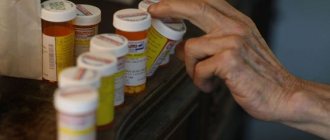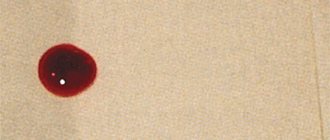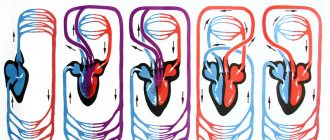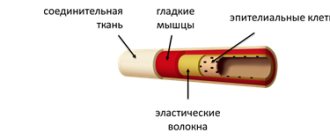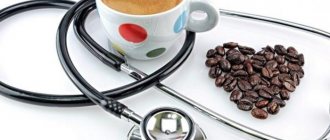Low pulse is one of the complaints of patients in cardiology departments. This phenomenon can cause many unpleasant moments, since it is accompanied by fainting states, weakness, cold sweat, dizziness, often being a sign of serious illness. Its systematic occurrence is a reason to seek professional medical help.
In order to find out the cause of a rare pulse, the doctor prescribes comprehensive diagnostic tests to identify existing problems. The pulse is represented by jerky oscillations of the arterial walls, by which the heart rate can be tracked and, having identified their violations, appropriate measures can be taken.
If you look at the accepted indicators of normal heart rate for different ages, you can conclude that it decreases as you get older. This is due to the growth of the muscular middle layer, known as the myocardium. The larger the volume of the heart, the fewer beats it needs to make in order to pump blood.
Causes of low heart rate
Despite the fact that the maximum frequency indicators can be called conditional and individual, depending on a number of factors (undoubtedly, within certain limits), the pulse is below 50 beats/min. - a sign of the presence of a disease. Its reduction to forty beats poses a threat to health and life, since the brain suffers from oxygen starvation. If it does not exceed forty beats within seven days, this is a sign of bradycardia, and with a progressive decrease, you should urgently seek professional medical help.
Almost all initiating factors of a pulse below normal are related to pathological conditions. For convenience, experts divide them into different categories, which can be found in our table.
| Category of reasons | How is it manifested? |
| Physiological | There are a number of natural factors and external influences that initiate a low pulse at normal pressure. Such conditions are not dangerous. This:
|
| Cardiological | The reasons for low blood pressure and low pulse may lie in the weakness of such a vital organ as the heart. They occur in the following diseases:
|
| Toxicological | Low blood pressure and low pulse can develop due to interaction with toxic substances when:
|
| Associated pathological conditions |
|
Low heart rate in the elderly is associated with age-related changes in the body. It often develops due to concomitant diseases or a natural slowdown in the body’s metabolic processes.
Restrictions for patients with rapid heartbeat
Reducing caffeine intake will help relieve tachycardia and other unpleasant symptoms. To do this you need to adhere to the following rules:
- To reduce the risk of withdrawal symptoms, gradually reduce the amount of caffeine in your diet. Drink one less cup of coffee each day or avoid drinking it late at night.
- Choose decaffeinated coffee.
- Some medications, such as painkillers, contain about 130 mg of caffeine. When you use these medications, choose caffeine-free products.
- When your heart rate increases, you need to drink the drink without sugar, you can add cream.
- It is better to drink coffee thirty minutes after breakfast, and not on an empty stomach.
- Instant coffee should be excluded from the diet altogether. It can disrupt the functioning of even a completely healthy heart.
- Some medications and herbal supplements, including theophylline, echinacea, and some antibiotics such as ciprofloxacin and norfloxacin, may increase the effects of caffeine, making tachycardia more likely. If you start taking these medications, talk with your doctor about how much caffeine is safe for you.
Women who are expecting and breastfeeding, as well as people with hypertension or stomach ulcers should avoid or strictly limit their caffeine intake. For example, pregnant women are not recommended to drink more than two cups of coffee a day, as it has a negative effect on the fetus - in particular, it increases the risk of having a child with a cleft lip and heart defects.
Clinical manifestations of low heart rate
A moderate decrease in pressure most often does not lead to the development of clinical manifestations and is not accompanied by circulatory disorders. However, with a heart rate of no more than forty beats per minute, the following are observed:
- dizziness;
- weakness;
- semi-fainting and fainting;
- feeling of constant fatigue;
- labored breathing;
- pain symptoms in the chest area;
- blood pressure surges;
- inability to concentrate;
- forgetfulness;
- visual impairment.
Symptoms with a low pulse correspond to circulatory disorders that appear against its background. So, if it is slowed down, the brain suffers from a lack of oxygen and hypoxia develops (that is, oxygen starvation). As a result, the patient is susceptible to convulsions and loss of consciousness, lasting from several seconds to one minute. Such conditions are life-threatening and can cause respiratory arrest and therefore require immediate medical attention.
Mechanisms of influence
Coffee, tea and chocolate shakes contain natural xanthines such as caffeine and theobromine.
They stimulate the nervous system, especially the cortex and brain stem, accelerating certain physiological processes. In some people, these substances provoke allergic reactions: skin rashes, itching, shortness of breath, cough. Coffee has the ability to constrict blood vessels, increase blood pressure and stimulate the heart to pump blood faster. Even 50–300 mg of caffeine (about two cups of coffee) can affect your heart rate (HR) and blood pressure levels. Each person's sensitivity to this substance is individual, so your heart rate may increase even if you consume less coffee.
A fatal overdose of caffeine is also theoretically possible, for the average person this would be between 80 and 100 cups of coffee consumed in a short time.
The link between coffee and heart attacks has not been confirmed. However, if you have high blood pressure, drinking the drink can further increase these levels, leading to a heart attack or stroke.
For most people, 2-4 cups of coffee per day will not do any harm. However, an increased dose, even in a healthy person, can cause negative side effects.
You exceed your caffeine allowance if, after drinking the drink:
- your heart rate constantly rises above 100;
- you experience rapid heartbeat, involuntary muscle contractions, upset stomach, shortness of breath, or anxiety.
If you want to know everything about tachycardia, we recommend watching the video below at the link. Causes, symptoms, diagnosis and signs that it’s time to see a doctor - talk about all this in 7 minutes. Enjoy watching!
Diagnosis of low heart rate
Determining the causes of a pathologically low pulse requires a comprehensive diagnosis. First of all, the doctor listens to the patient’s complaints, collects anamnesis and conducts an examination. If bradycardia (i.e., decreased heart rate) is detected, the patient is prescribed a consultation with a cardiologist. As for diagnostic studies, they are as follows:
- Electrocardiography;
- Daily Holter monitoring;
- Ultrasound scan of the heart;
- EchoCG;
- Bicycle ergometry.
In addition, if necessary, TEE can be performed, which allows one to study the conduction pathways of the heart and determine the organic or functional nature of the disease.
With and without sugar, with milk and black, in grains and instant. Espresso, latte, Americano, cappuccino... Every day, 2.25 billion cups of coffee are drunk in the world. Disputes about the benefits and harms of the aromatic drink do not subside both in the medical community and among ordinary people. What beneficial and harmful properties are not attributed to it. We'll tell you how not to get confused.
Let's look through the pharmacological reference book
The main active ingredient in coffee beans is caffeine. Its content in them varies depending on the variety, on average it is about 1%.
Let's turn to the pharmacological reference book.
Caffeine is used in medicine as a psychostimulant.
Indicated for diseases accompanied by suppression of the functions of the central nervous system and cardiovascular system (in this series, infectious diseases, drug poisoning, migraine, etc.), to increase mental and physical tone when performing responsible and urgent work, as well as for bedwetting urine.
Available in tablets of 100 and 200 mg. One cup of coffee usually contains about 100-200 mg of caffeine. Let's estimate: 1 tablet - 1 cup of coffee. The average dose of caffeine for an adult patient (for medical indications), according to the pharmacological formulary, is 50-100 mg 2-3 times a day.
Let's calculate, so to speak, the therapeutic dose of coffee: the optimal dose for an ordinary, more or less healthy person can be considered 2-3 cups of coffee per day (up to 300 mg). We’ll talk about the peculiarities of coffee consumption for specific diagnoses below.
Effect of caffeine on major body systems
One of the first to study the pharmacological effects of caffeine was the famous Russian physiologist I.P. Pavlov, the same one who studied conditioned reflexes in dogs.
- Central nervous system. Much depends on the liver
Caffeine is a psychomotor stimulant. The stimulating effect leads to increased mental and physical performance, reduced fatigue and drowsiness. But it's important to remember:
Large doses of caffeine can lead to exhaustion of the nervous system.
In addition, there is individual sensitivity to caffeine. If coffee is metabolized genetically in the liver, sensitivity to caffeine will be increased.
The implementation of the effects of caffeine is also influenced by the functional state of the liver. Attention: if it is violated, even a small dose can lead to an overdose!
- The cardiovascular system. A person with hypertension will have even higher blood pressure
Cardiac activity under the influence of caffeine increases, heart contractions become more intense, and heart rate increases. This effect is beneficial for a young heart and elastic blood vessels in reasonable doses.
But now let’s imagine: the coronary vessels are already affected by atherosclerosis, their lumen is narrowed. Intense work requires a lot of money, and the heart muscle's need for oxygen increases.
Narrowed vessels will not be able to meet the oxygen demand of the heart muscle, and ischemia will develop: angina pectoris, myocardial infarction.
See also: IHD.
Oxygen is cut off to the heart. Caffeine increases low blood pressure. At normal pressure, no significant changes occur. This is explained by the fact that caffeine has multidirectional effects on the vessels of the abdominal cavity (except the kidneys) and the vessels of skeletal muscles and other areas of the body (brain, heart, kidneys). He narrows the first, and expands the second.
See also: Arterial hypertension
What if the blood pressure is high? As a rule, a hypertensive patient already has signs of atherosclerosis and the elasticity of the wall is lost. Under such conditions, the multidirectional effects of the drug will not be neutralized. The pressure will become even higher.
Conclusion: coffee is not recommended for persons with severe arterial hypertension, angina pectoris, or previous myocardial infarction!
- Urinary system. Don't forget about a balanced diet
Caffeine increases diuresis (the production and release of urine). This is due not only to the expansion of the renal arteries, but also to a decrease in reabsorption (reabsorption) of electrolytes (Na, K, Ca, Mg ions) in the renal tubules. This leads to their elimination from the body.
A large number of articles widely discuss the issue of calcium removal from the body. Why only it, since potassium, magnesium and other electrolytes are also excreted? I hasten to calm you down. About 6 mg of calcium is lost with a cup of coffee, and about the same dose of calcium is contained in 1 teaspoon of milk. In the course of life, the body both loses and gains. This is normal metabolism.
With a rational, balanced diet, all such losses from drinking coffee can be made up.
- Digestive organs. The intestines will thank you
Caffeine has an irritating effect on the gastric mucosa and increases the secretion of gastric juice. This can lead to exacerbation of chronic gastritis, gastric bleeding with a stomach ulcer. People with chronic gastritis and stomach ulcers are not recommended to abuse coffee.
Caffeine has a beneficial effect on intestinal motility, preventing constipation.
Other important effects of caffeine (about blood clots, diabetes, tumors and heat):
- reduces tissue resistance to insulin, preventing the development of diabetes;
See also: Blood clots. Attention resort lovers!
- is an antiplatelet agent, reduces the risk of thrombosis;
- has antioxidant properties - antitumor effect;
- increases metabolism and heat production - you won’t lose much weight, but it will help you warm up.
Milk reduces and slows down. Sugar makes you heavier
See also: Break the cholesterol gene
A cup of black coffee contains about 4-7 kcal. When sugar and milk are added, its calorie content increases. One teaspoon of sugar adds another 24 kcal, 50 ml of milk - about 30 kcal. Thus, a cup of coffee with 2 tablespoons of sugar and 50 ml of milk will contain about 80 kcal.
See also: I eat what I want
You can calculate the energy value of your cup yourself. And don’t forget to include it in your overall caloric intake (if you are fighting excess weight).
By the way, milk slows down the absorption process. When you add it to coffee, you will not get a sharp high (peak) increase in caffeine in the blood, but a low, extended “plateau” over time.
If you want to reduce the effects of caffeine, drink coffee with milk.
In addition, milk reduces the irritating effect of coffee on the gastric mucosa.
Ground or instant?
Everything natural is preferable. During the production of instant coffee, the product is treated with various chemicals. And their effect on the body cannot always be predicted.
Is there an addiction to coffee? Mechanism of action of caffeine
You won’t find coffee addiction in any of the disease classifications. But many know from their own experience: as soon as you give up the usual cup of aromatic drink, lethargy, apathy, and drowsiness immediately set in. The point is the mechanism of action of caffeine.
There are adenosine receptors in the brain. The structure of the molecules of adenosine (this is a substance that causes inhibition processes) and caffeine is similar.
Adenosine causes a decrease in excitation processes in the brain. Caffeine replacing it leads to a stimulating effect. With long-term coffee consumption, new adenosine receptors are formed. An even larger dose of caffeine is required to bind all available receptors. In other words, it is possible to develop an addiction to coffee.
If you suddenly stop drinking coffee, all existing receptors will bind to adenosine. Inhibition processes will develop in the brain.
Hence lethargy, drowsiness, depression. However, within a week (after caffeine stops entering the body), the number of receptors can return to normal.
Therefore, if you want to reduce your caffeine dose and still feel good, give up coffee gradually.
Everything is good in moderation and in reasonable doses.
See also: Myocardial infarction
Even ancient healers said: “There is medicine in a spoon, poison in a cup.” If you want coffee to bring pleasure and benefit, do not abuse it. 2-3 cups a day is the dose that will help maintain vigor, efficiency and good mood.
In case of long-term severe arterial hypertension, previous myocardial infarction, or gastric ulcer, coffee is unsafe.
Main photo of the article from the site s1.1zoom.me
Treatment for low heart rate
A moderate decrease in heart rate that occurs without symptoms does not require therapy. However, if it exists, the underlying pathology must be treated. The strategy depends on the underlying disease, but in any case is aimed at:
- Elimination of symptoms of low heart rate;
- Eliminating the risk of heart rhythm disturbances;
- Prevention of thrombosis development.
If the problem arose as a result of uncontrolled use of pharmacological drugs, their dose is adjusted - or, if they are not needed, completely canceled.
When does caffeine lower blood pressure?
Caffeine, when consumed in moderation, always keeps blood pressure normal. It stimulates the nervous system, dilates blood vessels, which leads to a feeling of cheerfulness. Therefore, it is recommended to drink the drink only when drowsiness or fatigue. It is not recommended to drink it at night.
There is a widespread belief among people that drinking coffee with added alcohol lowers blood pressure. It is a myth. Doctors do not recommend mixing these drinks. This combination not only increases blood pressure, but can also cause arrhythmia and liver disease. However, some doctors allow a combination of coffee and cognac (up to 70 g of the latter per day). Strong alcohol lowers blood pressure and normalizes heartbeat and blood flow, which neutralizes the effect of coffee.
Another similar principle works if you mix coffee with milk or other dairy, but not too fatty additives. The fact is that proteins and fats prevent the absorption of caffeine into the walls of blood vessels. However, this does not mean that any combination of drinks completely eliminates risks and dangers. This combination is safe for healthy people, but such mixtures are contraindicated for hypertensive patients. In this case, you cannot count on a decrease in pressure.
The only case where a drink definitely lowers blood pressure is decaffeinated coffee. This product does not contain the main substance that excites the nervous system. Only those elements that have a diuretic effect remain, which leads to a decrease in blood pressure. This type of product should not be taken by people with hypotension.
How to quickly increase your heart rate?
If a rare pulse is not a symptom of heart disease and appears for physiological reasons, you can speed it up and eliminate unpleasant symptoms by using simple remedies available in almost every home. Before starting activities, it is important to take into account the circumstances under which the heart rate decreased.
| Initiating factor | How and with what is it manifested? |
| Stress, shock, nervous disorders | If the heart rate decreases to forty beats per minute or below, you can take sedatives:
|
| Decreased blood pressure and pulse | The best option is to take decoctions for:
|
| Increased blood pressure and decreased heart rate | The best solution would be:
|
| Pregnancy |
|
If a person is sufficiently resilient and healthy, physical activity (from running, jumping and squats to cardio exercises) would be a good option.
The effect of coffee on blood pressure
Speaking about the effect, you need to take into account the initial blood pressure indicators: normal, increased or decreased. For a healthy person, this drink does not pose a threat; on the contrary, coffee has a positive effect:
- helps to wake up;
- improves concentration;
- relieves headaches;
- provides a slight laxative effect;
- speeds up metabolism;
- activates brain function;
- lifts the mood;
- has a mild diuretic effect and relieves swelling;
- provides prevention of cancer, cirrhosis, diabetes;
- reduces cravings for sweets;
- serves as an antioxidant.
The iron and potassium contained in the product, when consumed in moderation, help maintain the health of the cardiovascular and circulatory systems. However, it is important to remember that we are talking about a natural product in grains, and not about its analogues. Only grains contain all the necessary nutrients, microelements, vitamins, and nutrients. The soluble product contains fats and waste from processing.
Caffeine affects blood pressure, but the effect varies. If consumption does not exceed acceptable levels (1-2 cups per day, provided that the consumer feels normal), then a healthy person does not feel any changes; sometimes coffee lowers blood pressure (slightly and temporarily). If you abuse this drink, your blood pressure drops, even to the point of developing hypotension.
If there is too much caffeine in the body, the product raises a person’s blood pressure and provokes increased production of adrenaline, cortisol and other stress hormones. Frequent and abundant consumption of the drink can also provoke the development of hypertension, arrhythmia, tachycardia, blood diseases and cause increased heart rate.
Interesting! Is it possible to drink coffee at night?
Many coffee lovers are interested in how many notches their favorite drink increases blood pressure. It is enough to drink 2-3 cups of drink per day so that the upper pressure after coffee rises by 8-10 values, and the lower one by 5-7. For someone who already suffers from hypertension, these are significant changes. This is especially acute in the first 60 minutes, but the effect can last for three hours or even longer. Therefore, doctors recommend that all lovers of this drink reduce their usual portions.
While everything is more or less clear about the influence of the classic product, there is still controversy surrounding green coffee. Some say it is a safe and healthy product. And someone claims that this is an identical product. The truth is in the middle: these are unroasted coffee beans, meaning their composition and effect are similar to the roasted product. It turns out that all of the above is true for an “outlandish” type of product.
How does the drink affect people suffering from hypertension or hypotension? Let's take a closer look.
With increased
For hypertension, coffee can help lower blood pressure. However, for this you need to drink it according to a special scheme: drink 2-3 cups of the drink daily. In addition, the researchers note that natural predisposition plays a role: in some people coffee increases blood pressure, while in others it causes blood pressure to drop. It all depends on the individual characteristics of the body, which are difficult to determine in advance, as well as difficult to notice with the naked eye. You need to listen to yourself and observe your reaction to coffee.
Another feature that experts note is that if high blood pressure is caused by caffeine addiction, then there is no need to worry. If a person drinks 2-3 cups of this drink daily for three years, then such a lifestyle cannot cause an even greater deterioration in blood pressure.
Interesting! Why do you serve cold water with coffee?
At reduced
Some people recommend drinking coffee for hypotension because caffeine supposedly raises blood pressure. Yes, many people with addiction experience a slight increase in blood pressure, which helps them feel great and more alert. However, doctors do not approve of this method. Experts are confident that with low blood pressure, the drink can both increase it and lower it even further. Therefore, doctors do not recommend drinking coffee to increase blood pressure. It is better to use sweet tea or take medications prescribed by your doctor. If we are not talking about addiction, then a cup of strong drink, consumed from time to time, can help people with hypotension. However, frequent use with the best intentions will cause the body to develop a habit. Then the entire increasing effect will be nullified.
Prevention of rare pulse
Preventive measures boil down to timely treatment of organic heart lesions, elimination of the effects of toxic substances on the myocardium, competent selection of doses of pharmacological drugs and their administration under medical supervision. Don't forget to make regular preventive visits to your therapist and cardiologist.
Make an appointment with CELT specialists and find out the reasons for your rare pulse without delay.
Make an appointment through the application or by calling +7 +7 We work every day:
- Monday—Friday: 8.00—20.00
- Saturday: 8.00–18.00
- Sunday is a day off
The nearest metro and MCC stations to the clinic:
- Highway of Enthusiasts or Perovo
- Partisan
- Enthusiast Highway
Driving directions
